Welcome back
Looking forward to seeing you back at school on Tuesday 5th September. I hope you have all had a great summer. Staff have just finished their first day back at work and are all ready to welcome the children to the new school year.
Christmas card competition
The Lord Mayor of Leeds, Jane Dowson, is looking to have her Christmas card 2017 designed by a child from Leeds (aged up to 13 years). The card will be sent out by the Lord Mayor across the city and beyond. The theme is “Leeds at Christmas”.
The rules/details are on the attached poster and the closing date is 09 October. The winner will be presented with a copy of the card and a special gift by the Lord Mayor.
This is a really exciting and unique opportunity for children.
How to enter: Designs should be completed on A4 paper. Please write (in pencil) the child’s name and age on the reverse and a parent or guardian’s contact number. Crayons, felt tip, pen and paint can be used for the design, however items should not be stuck on to the paper as this will not replicate when the design is scanned. Entries should be sent to: Lord Mayor Christmas Card Competition, 8 Woodhouse Square, Leeds LS3 1AD by the closing date of Monday 09 October 2017.
Our annual parents/carers survey
Thanks to all those of you who took the time to complete our recent parent / carer survey. There were 89 responses in total – that’s around one in four of you. The responses are fairly evenly spread across the classes so we have a good representation across the school.
It appears a few parents have completed the survey more than once: one parent completed the survey seven times, another three, another two (and others possibly, as it is possible to submit anonymously). Despite this, the response rate is higher than last year. (We hope this duplication is accidental!)
Below is a summary of what you’ve said. However, please do bear in mind this note of caution: it’s hard to present a summary or interpret the feedback very accurately due to the few multiple responses from the same people.
Lots of you added some comments after each question; we’ve included here just one or two positive and negative comments that represent typical responses. Please do contact us directly if you said something which might help us improve further. We can’t guarantee we can accommodate everyone’s wishes or opinions, but we do guarantee we consider each one.
In case you’ve not spotted it, we’ve installed a post box in the front hall area so you can post any sort of feedback, as and when you like. And, of course, Miss Hague and I are often around at the start and end of the school day – we’ve started noticing more parents give us more positive comments, which is great – but we do welcome all constructive feedback.
1. My child is happy at Scholes (Elmet) Primary School.
95.5% agreed or strongly agreed with this, which is great, and represents an increase on the 2016 figure. This is a step in the right direction!
Of the seven comments, four were positive (‘All of my children have been, on the whole, very happy at Scholes school.’) and one was negative, raising concerns from some years ago: ‘I spoke to the school but it always seemed to be swept under the carpet and never dealt with properly’. A lot has changed since then. If you do have concerns, I hope you would find they would be dealt in a satisfactory way by Miss Hague.
The remaining comments related to split age classes – we know this is something that causes concern (at Scholes and in any school where the admissions number does not allow for single age intakes of 30, 60 or 90 – ours is 45). However, this year saw far fewer issues as we allocated pupils to classes. We no longer have mixed classes crossing different key stages (such as a Reception-Year 1 class), and nor do we have mixed classes where a small number from one year group is overshadowed by another (as was the case in a Year 5,6 class in 2015-16) – neither set-up supports good learning.
2. My child feels safe at this school.
92.1% agreed or strongly agreed with this. The comments show, however, that one respondent answered this question seven times (which matches the number who indicated they disagree), which will have skewed the results.
Including just one of the seven duplicate comments, all three comments refer to individual pupils. With tightening budgets, we, and most other schools in the area, are finding this a challenge. However, we’re working hard to address the concerns here – we’ve employed a Learning Mentor and allocated support staff accordingly, for example.
3. My child makes good progress at this school.
74.2% agreed or strongly agreed with this. 17 parents / carers disagreed, but seven of these were from the same parent.
Looking at the comments, respondents cited various points, the main one being mixed age classes. We don’t think this automatically causes children to progress less, but we do want to explore different ways to meet the needs of all pupils in the class.
One parent said: ‘I feel that progress slowed a bit in KS2.’ This matches the findings of Ofsted inspectors in our recent inspection. We’re working hard to address this.
Another said: ‘She’s achieving. If homework was supplied I think she’d be higher in her attainment.’ We’re changing our homework policy from September – you’ll hopefully have read about it in the last newsletter of the year.
There were positive comments, too, such as ‘seen so much progress from both children’.
4. My child is well looked after.
93.3% agreed or strongly agreed here – that’s an increase on the previous year.
Comments here range from ‘My daughter has some anxiety issues and each and every member of staff has been so kind and caring towards her’ and ‘Any minor injuries are dealt with well’ to a couple of concerns about lunchtimes which we’ll take on board.
One comment was about very specific individual needs; if you think your child’s specific needs are not being met, please do speak with someone about it.
5. My child is taught well at Scholes (Elmet) Primary School.
76.4% agreed or strongly agreed with this, with quite a large proportion unsure.
Excluding duplicated comments, three were largely positive (‘The teachers create a supportive and engaging learning environment.’), five were mixed (‘Have some concerns as one child is high achieving and finds the work too easy a lot of the time. All other children doing well and making progress so would say they are taught well’), three were negative (‘I strongly disagree with split classes in year six and do not believe it is beneficial to their education or socially. This year there have been three year 5/6 class splits and my son is being taught with children nearly two years younger??’).
Our School Improvement Advisor has visited school twice since our Ofsted inspection and is very encouraged by the improvements he sees, as are we, but of course we know we want to get better and better by tackling subject knowledge, increase reading, writing and maths skills being used across all curriculum subjects, and other key areas.
6. Adults in school make sure pupils are well behaved.
83.2% of you were in agreement here (an increase on last year), and most others were unsure.
Understandably, comments cited concerns around the behaviour of specific individuals: ‘I do believe generally behaviour in school is good but there are some children in the school with very challenging behaviour and the school seem to reward these children more than children who behave well. Which seems unfair to the children who do behave well.’ We understand concerns such as these. More and more headteachers are reporting an increase in the number of pupils who present challenging behaviour. We’re working closely with behaviour and inclusion consultants to tackle this issue, and we have instances this year where we have excluded pupils.
7. Scholes (Elmet) Primary School deals effectively with bullying.
It’s encouraging to see only 3.4% of respondents disagreed with this statement – that’s a fall from the previous year.
It’s also quite typical that there is a large proportion of parents / carers who indicate they are unsure (this year, 36.0%) – respondents cite the reason for this being that their child hasn’t encountered bullying (‘I don’t know as we aren’t in school, but my child fully understands the behaviour policy.’). The proportion agreeing has increased by around half as much as in 2016.
Incidentally, it’s always worth mentioning two core messages about bullying. We define bullying as upsetting or harmful behaviour which is Several Times On Purpose, and we encourage children to Start Telling Other People before it becomes a problem. Please help us reinforce this message at home, too.
8. The school is well led and managed.
Whilst there’s clearly still room for improvement, this statement is one which has increased a lot, which is really encouraging: 73.0% agreed or strongly agreed this year. We’re trying to be more open and to communicate better, and this might account for substantially fewer than last year saying they were unsure about leadership.
Interestingly, this statement prompted the most number of comments (even taking into account any duplicated responses) – the comments split quite evenly into positive (‘Miss Hague and Mr Roundtree seem to make an amazing team, management has never been better in my opinion.’), neutral (‘The school is still in a period of transition and the current leadership team requires further development. The fact that Mr Roundtree went from managing one school, to two, to three within six months is of concern as it may be the case that he is very busy and may not have the capacity to address all issues in a timely manner.’) and negative (‘I would like to see more information about what the governors are doing. I think this needs to be better advertised.’).
9. The school responds well to any concerns I raise.
This is another area that’s increased quite a lot from last year, with still room for improvement. 73.0% agreed or strongly agreed: ‘The concerns I had regarding my daughter have been dealt with sensitively and quickly.’
Negative comments include: ‘There is still, unfortunately, a culture of denial and self-preservation within the school, in my opinion.’ I hope the fact we’ve produced this report, highlighting concerns as well as improvements, will help to reassure you we want to change this perception.
10. I receive useful information from the school about my child’s progress.
64.1% agreed or agreed strongly with this statement. Compared to last year, almost double the proportion of parents / carers agreed strongly, but we’re disappointed that not more of you feel we provide useful information.
Since last year, we have introduced a new website with clear age-related expectations for every subject; at parents’ evenings, we’ve introduced a Learning Update document indicating attainment and progress; and your child’s annual report now includes an indication of progress in every subject.
For 2017-18, we have planned a number of learning workshops to help you support your child at home, plus various open sessions where you can come into school. Following the annual report, there will be a drop-in session where we invite you as parents / carers to come in with any questions you might have specifically about the reports.
Many of the concerns related to parents’ evenings, such as this one: ‘I only get updates at parents evening and sometime I feel that I am rushed and they are waiting for me to ask all the questions when I just want the teacher to tell me all I need to know. As I don’t know all the questions to ask about each topic.’ So, for 2017-18, we will also double the time allocation at parents’ evening from five to ten minutes, and make sure teachers have a (loose) agenda to work through so they provide as much useful information as possible. This is a direct response to what you’re telling us here – we are listening!
Finally…
…we asked you to tell us about things you like and the things we could improve on. This question is a result of our first post-Ofsted parents evening, when parents told us they wanted a more open-ended way to talk about the school.
You tell us that the things we could improve on are, amongst many quite diverse, specific points, the points that have already been mentioned here: mixed age classes; even more information about your child’s learning; and communication in general. Some suggestions are easier to address than others: for example, we’re already changing our homework practices, which was a common point raised, whereas someone suggested changing our admissions policy, which we can’t do as we are a local authority maintained school and must follow the Leeds policy.
The things you like are also quite wide-ranging, and they include the friendly atmosphere and the staff (many of you mentioned specific staff and we’ll make sure staff are made aware).
To end with: ‘Keep up the good work, I know the Ofsted report must have been a bitter pill to swallow. However, I don’t think they have captured the energy, spirit and belief that exists in Scholes Elmet Primary School, throughout the staff, teachers and pupils.’
Scholes swimming success
You might have spotted this headline recently: Action urged to teach children to swim. The story’s about a sizeable proportion of primary children leaving school not being able to swim 25m – the expected level:
Almost a third of 11-year-olds in England leave primary school unable to swim, a representative sample of 1,000 parents of Year 6 pupils suggests.
And two-thirds of the parents, surveyed for Swim England, feared their child could not save themselves in water.
Not so at Scholes! We have 98% of children in Year 4 achieving the National Curriculum standard of swimming 25 metres this year! Only one child did not meet the standard and we plan to arrange some 1:1 sessions with our swimming coach for this pupil.
How writing progresses across year groups
Now that we’ve finished the school year, we thought you might be interested to see the progress in writing from year to year. Below is an example of writing from each year group. We’ve chosen a good, typical example, not a flawless one. Also, it’s important to note that teachers don’t assess a pupil’s writing skills on just one piece – it’s writing a selection of different pieces over time that matters.
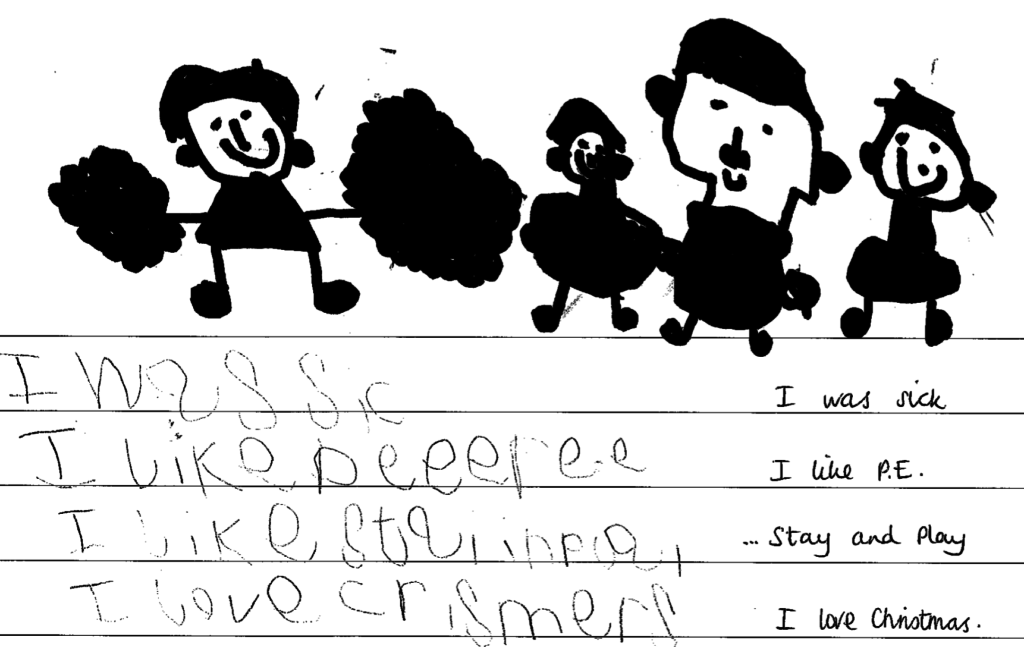
At the end of Reception, this child used his phonic knowledge to write words in ways which match their spoken sounds – while some words may not be correct, they are spelled in a way which is phonetically plausible (such as Crismers for Christmas). He has also accurately written some irregular common words (was, like, love). He could read back to the teacher his sentences – although a little small, the gaps between the words (we call them ‘finger spaces’) help.
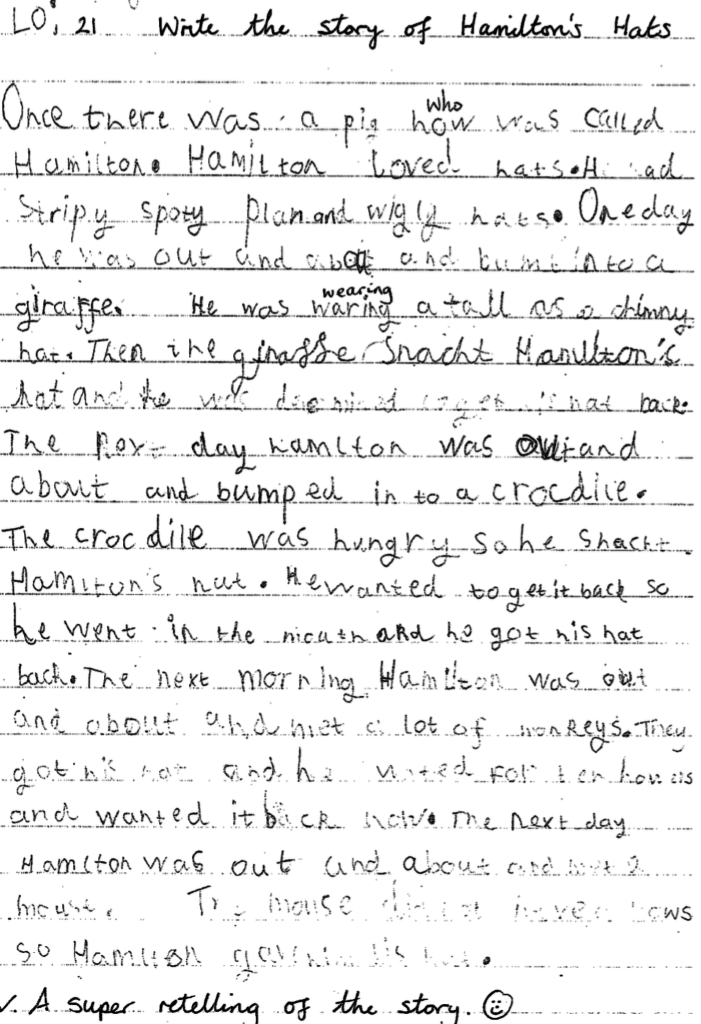
Hamilton’s Hats is a great story, and it’s a great idea to get your child at home to re-tell a familiar story, even if it’s just orally, rather than in written form as it is here. Straight away you can see what progress is made in Year 1! Sentences are effectively demarcated with capital letters and full stops; also and is used to join two clauses (clauses are ‘chunks’ of words that could be a sentence on their own). The sequence of sentences build up to form a narrative (a story) – it doesn’t matter that the story is not the child’s own because of all the great skills they’re practising, and because they’re writing quite a lengthy piece, too, but it manages to stay coherent.
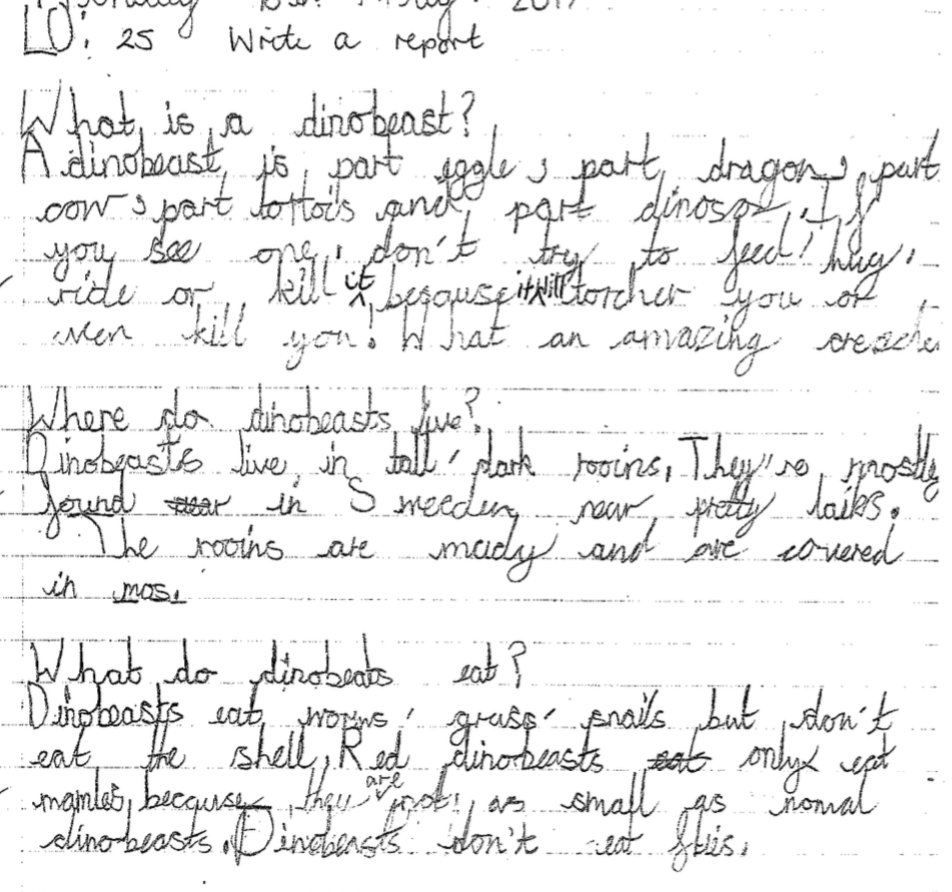
It’s not an expectation for Year 2 children to write in paragraphs or sections, but we find most children are able to do this, especially for non-narrative (non-story) writing such as this report (a report presents the reader with information, even if the information is fictional, as is the case here). In this writing, we can see a big jump in progress from the Year 1 piece, perhaps in two main ways: the range of punctuation used (we start to see question marks, exclamation marks, commas and apostrophes for contraction) and the neat, cursive handwriting. Also, more conjunctions are used: not just and, but also if, because, or, but.
You can also see the beginning of the writer’s editing. Next steps here would be to focus on identifying some of the spellings that need to be corrected: although it’s good the writer has made phonetically plausible attempts, like rooins and tortois, he now needs to have opportunities to check the spellings of at least some of the words. This is something you can practise at home: you could write a sentence with a deliberate spelling error, and your child could identify which word, and perhaps then go on to correct the spelling using a dictionary, or even try an internet search: if you Google ‘spell tortois‘, the first result will even say the word out loud, (it can be reassuring to hear the word you’ve found is the right one!).
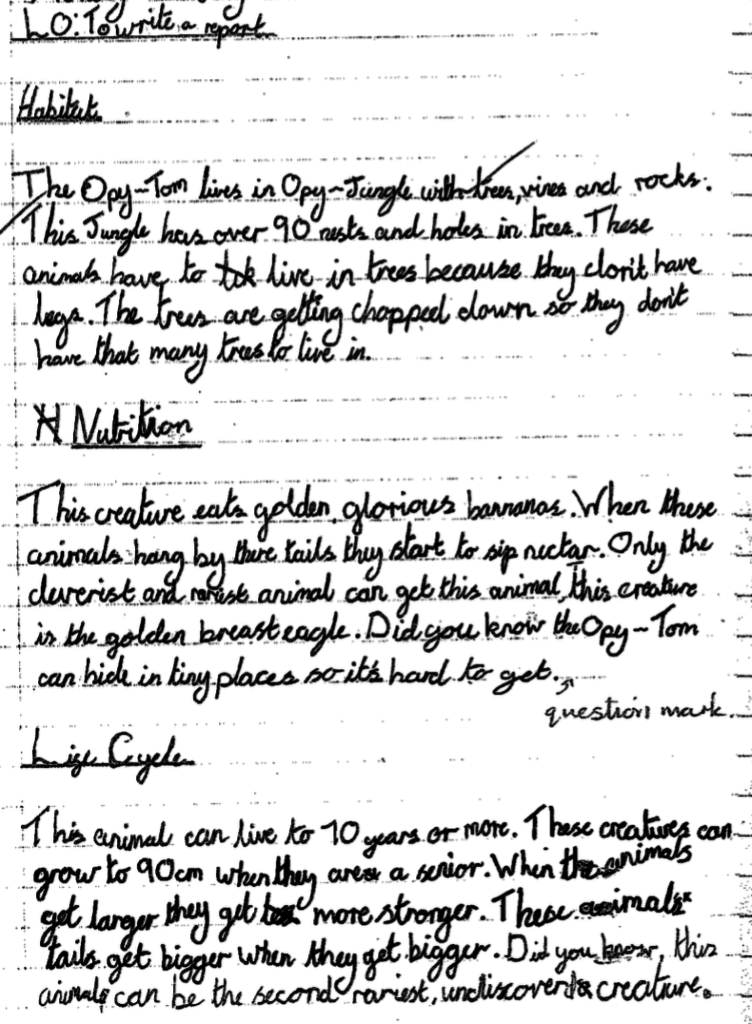
This Year 3 writing is the same task as the Year 2 one – writing a report, a factual piece (even though the actual content uses the writer’s imagination). There are encouraging signs of progression: hyphens (Opy-Tom, for example); rhetorical questions (although these need a question mark); and – perhaps easiest to miss – a wider variety of ways to start sentences (The Opy-Tom… , These animals… , Only the cleverest… ).
There’s one example of what we call ‘squashed sentences’ or, more accurately, run-on sentences. Can you find it? (Answers at the end of this article.) Even though the writer has used a comma, it’s still not ideal, as the comma is too weak to split the two clauses up. (It’s called a comma splice – a very common error, but one that can really undermine good writing later on.)
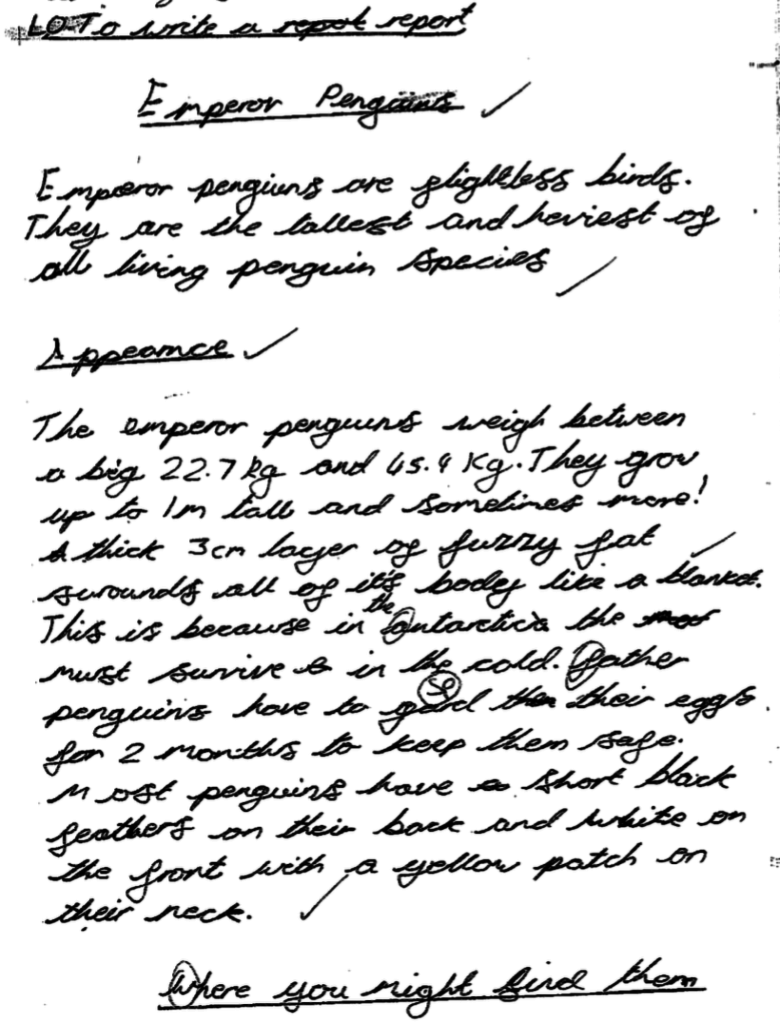
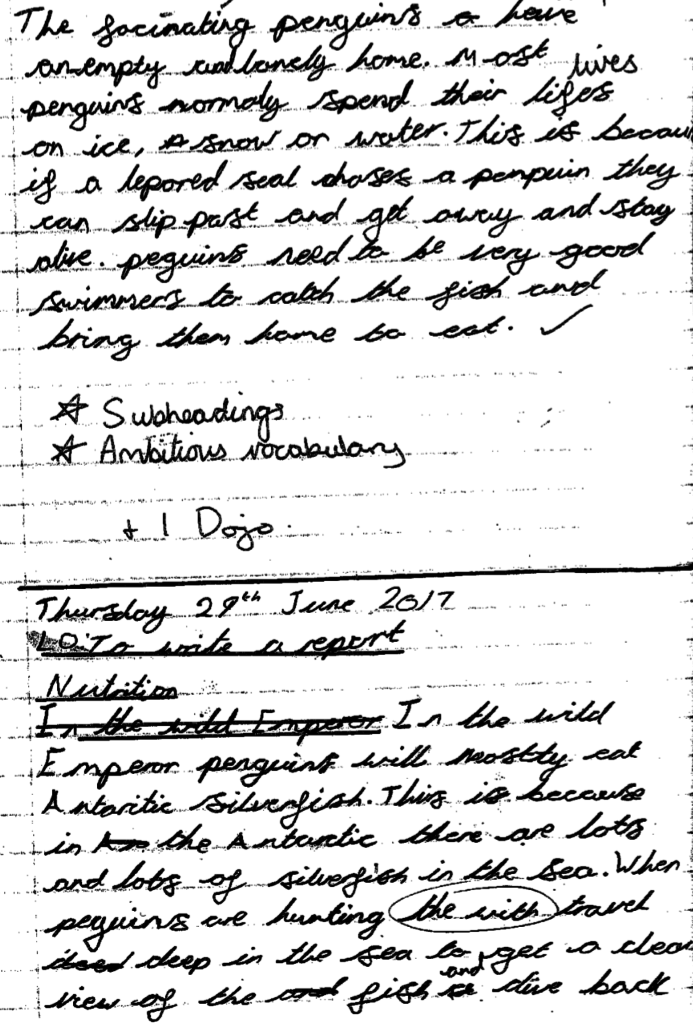
This Year 4 writing takes the same idea as in Year 2 and Year 3, but this time the content is about a real animal – that in itself shows progression. We can see the variety of ways to start sentences continues to widen, and the choice of vocabulary for description is good. What this writer needs to do more of is be alert to the need for capital letters, and teachers in school are building in more times for children to edit and improve their writing.
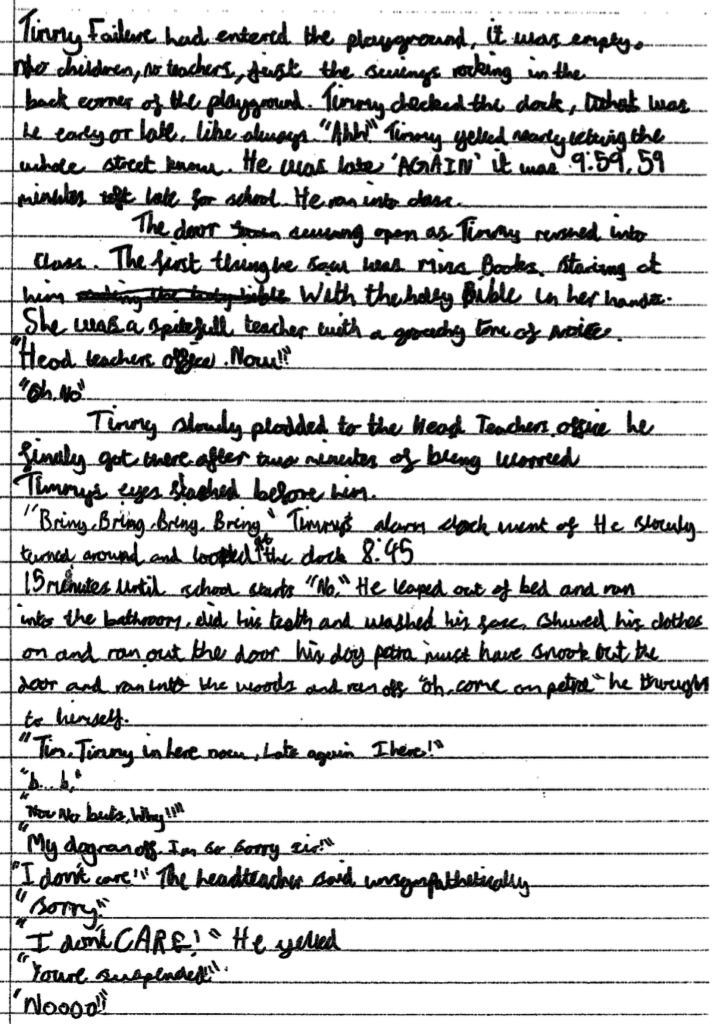
This Year 5 piece of writing is narrative – part of a story. There are a few errors dotted throughout – this is before any editing and improving took place. There is a good range of sentences, from short and simple (these help to develop emphasis and pace) to longer, more complex ones (these help to build up description). Punctuation is progressing – there is now ellipsis, for example. We can also see paragraphs being used effectively, and some good word choices (spiteful, plodded). A flashback scene (beginning Timmy’s eyes flash before him) is an ambitious attempt to organise writing in a more unusual way.
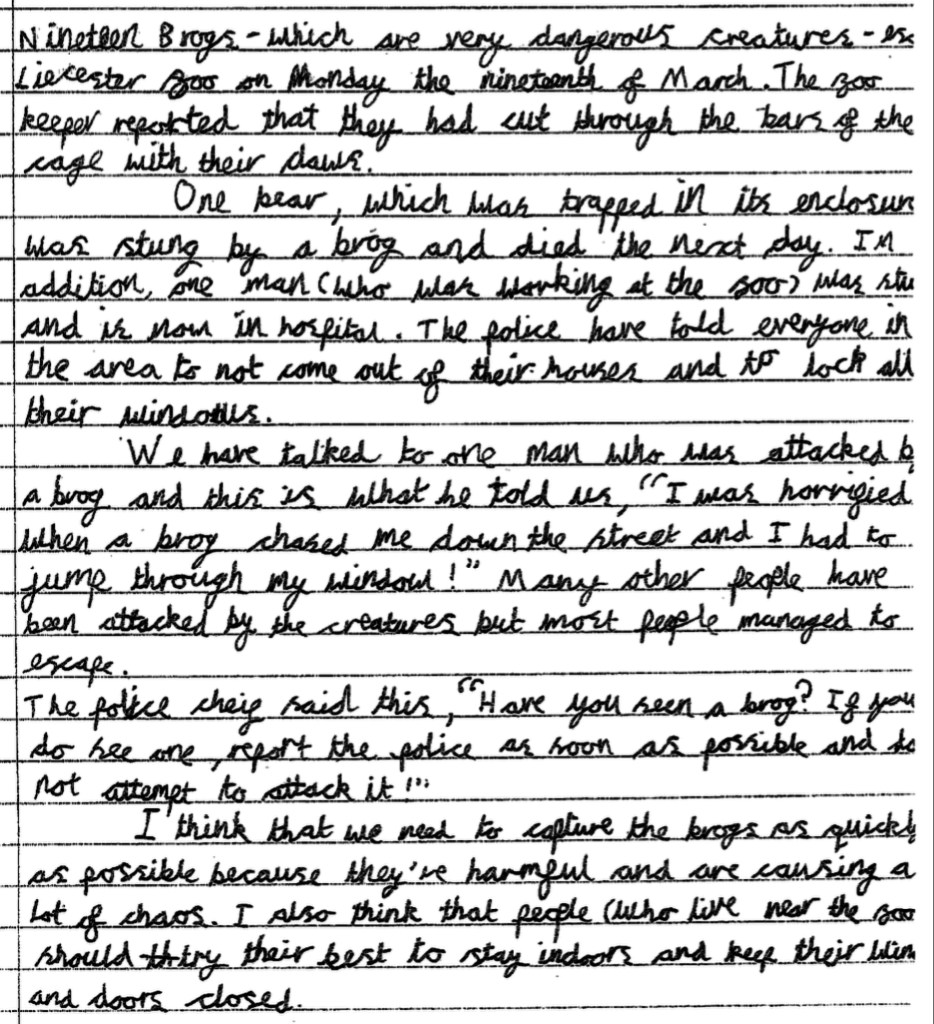
Here we arrive at some Year 6 writing. The task is to write about an imaginary creature (‘brogs’), as we’ve seen before, but this time to also build in a story and to produce some journalistic writing, for a newspaper perhaps. And your task? Think about how this piece shows progression across the years…
Finally, in the Year 3 writing, where was the ‘squashed sentence’ with only a comma splice? Only the cleverest and rarest animal can get this animal, this creature is the golden breast eagle. Rather than use a comma, the writer would be better to use a full-stop, or – more advanced – a semi-colon (Only the cleverest and rarest animal can get this animal; this creature is the golden breast eagle.) or a dash (Only the cleverest and rarest animal can get this animal – this creature is the golden breast eagle.).
We hope…
…you have a happy and healthy summer holiday.
There’s a lot to get up to in and around Leeds. Breeze is a good place to start looking, and also check out What’s On in Leeds and Leeds List.
The summer holiday is a long one, so keep up with reading. Encourage your child to continue to read often – quarter of an hour, most days will be a great way to keep their reading skills strong and their love of reading alight.
It’s not just about books – reading a comic or magazine, a website, a recipe, First News newspaper are all good ways to keep your child reading. Why not take a trip to one of Leeds’ libraries – a local one, or why not try the Central Library in town for an afternoon trip out?
You might also want to keep your child’s number skills fresh, too. For younger ones, knowing their number bonds is a good start. For older children, knowing their times tables and corresponding division facts is so important.
Taking up these top tips for learning will be a great way for your child to return to school in September hitting the ground running as a confident learner.
Don’t forget our summer competition, too. Whether you go away or not, we want to see some maths done in an unusual place or using unusual things, or a pic that shows somewhere/something ordinary but which shows lots of maths.
Take a photo and send it to scholesoffice@spherefederation.org or print it out and bring to school in the first week back in September – entries must be in by 08.09.17. There will be prizes for great examples of the Extreme Maths. We’re looking forward to seeing your entries!
Whatever you get up to, have a great holiday. See you on Tuesday 05 September.
Well done…
…to all these children, and one or two others, who have all got 100% attendance this year – that’s an amazing achievement!
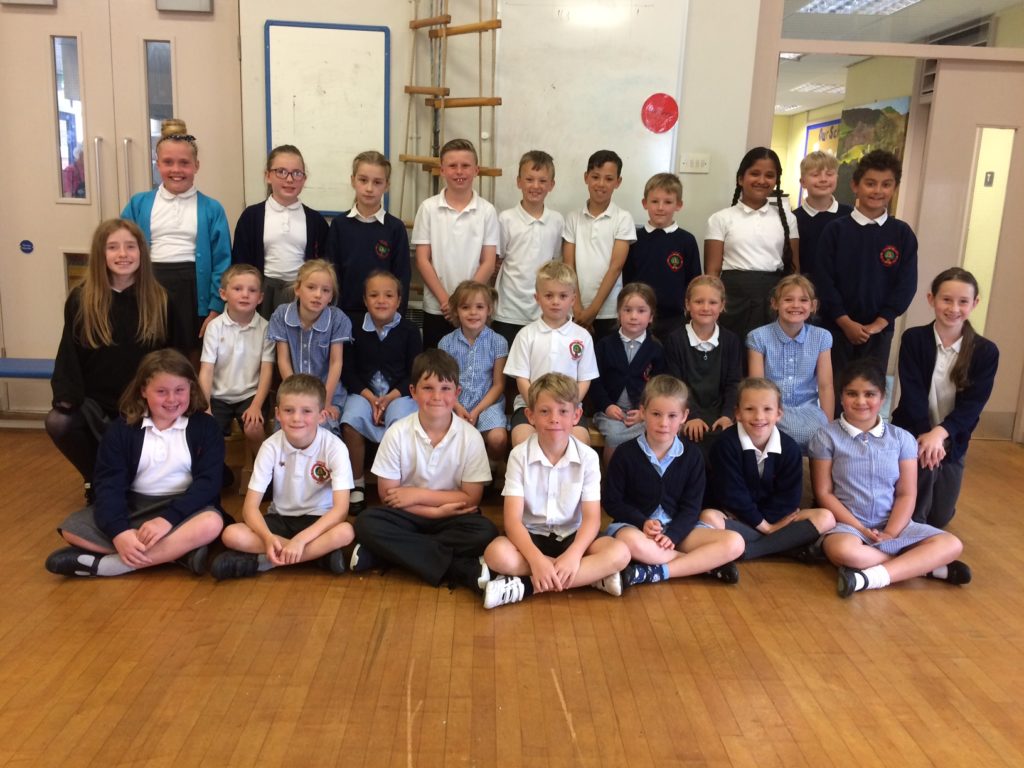
Goodbye…
…to all our wonderful Year 6 friends. We wish you lots of success and happiness and high school.
We also want to say goodbye to the staff who are leaving us today: Mr Cope and Miss Plienar; Mrs Ramsden (good, again!); and goodbye to these two characters…
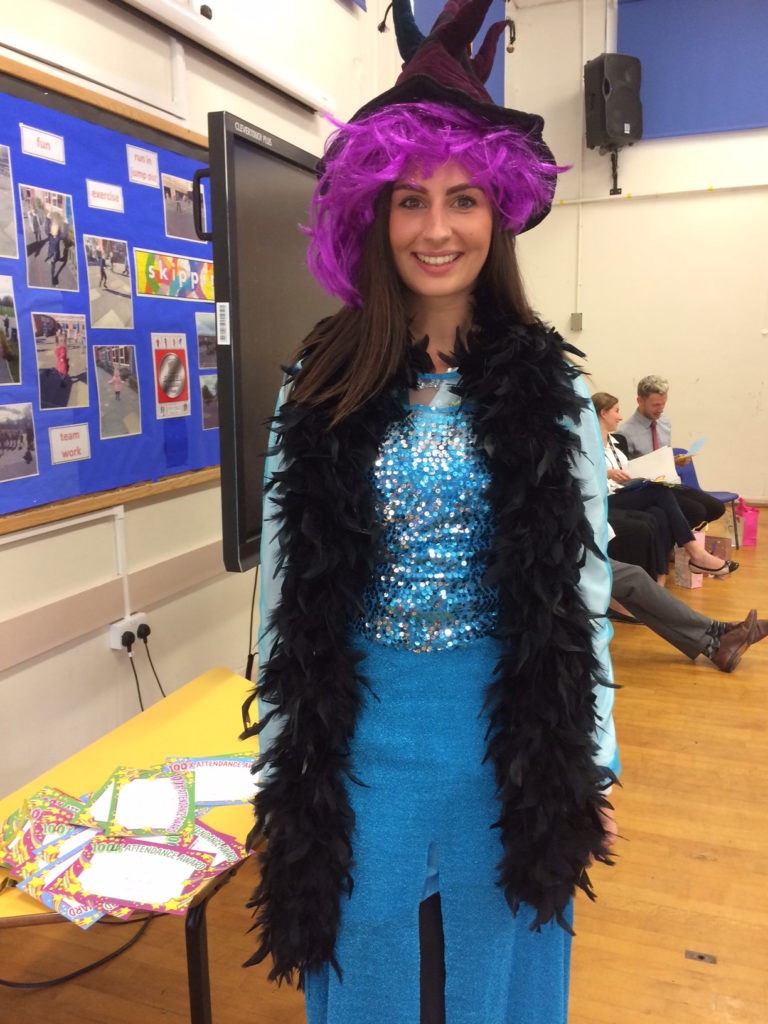
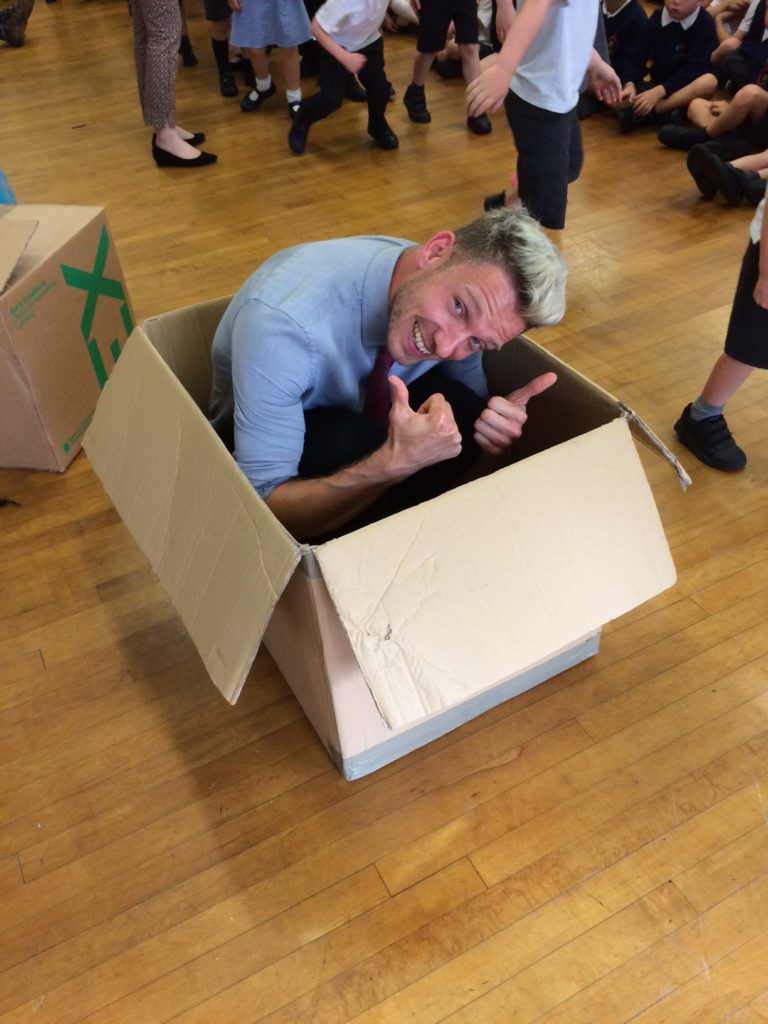
Ask your child why Miss Walker is dressed so bizaarely, and why Mr Mills is feeling somewhat boxed in!
Newsletter feedback
We recently sent you you a newsletter with your child’s class next year, plus various summaries of the changes to uniform, homework etc, plus lots of key dates for the year ahead.
We’ve had a number of people comment favourably on this end-of-year newsletter. Here’s one comment:
I’ve just read the newsletter ‘Next Year’s Class’. Just thought I’d say thank you as it’s a really well thought out, informative document. It’s so useful to have the information on homework and also those dates for the diary early on.
‘Talk Time’ discussions sound great.
[We] appreciate all the hard work that is happening in school. Hope you all have a great summer.
Fab feedback
A little while ago, we posted some comments, the views of ‘outsiders’ – educational advisors, consultants and other Leeds headteachers. Here’s an update… Someone has recently visited our school to conduct some pupil interviews, much like what an inspector would do. Here are just a few of extracts from the feedback:
- ‘Without exception, the children proved to be extremely open and articulate.’
- ‘…it was clear that children at Scholes do indeed feel safe within the school environment. The children are trusting of adults in school and know they can approach them with any worries regarding bullying, they are confident such issues, which are infrequent, will be dealt with appropriately.’
- ‘Without exception all the children interviewed enjoyed school.’